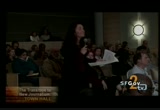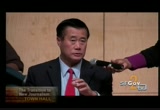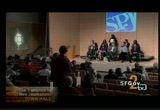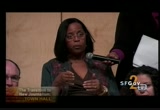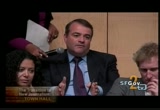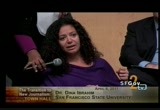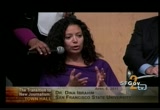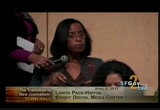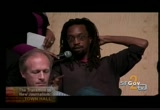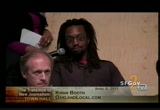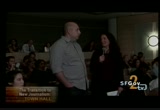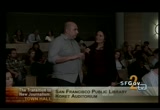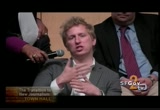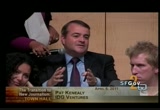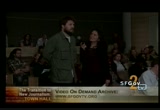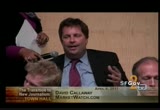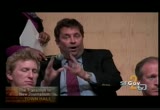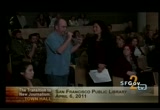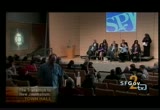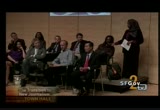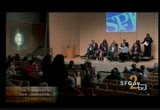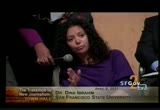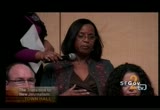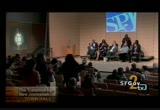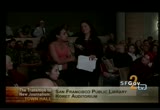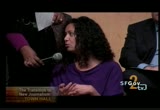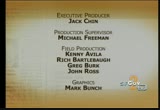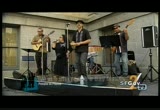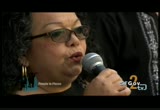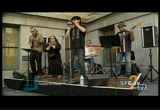tv [untitled] October 7, 2012 1:30am-2:00am PDT
1:30 am
not see that there is a lot of activity going on. there is a lot more than the tea party, is what i'm saying, and we just do not see that coverage. can you talk about the changes you have seen in sacramento as the number of reporters has been cut in more than half? >> as i say, when you decrease the number of reporters and do not have as many seasoned reporters, the depth of the information decreases. and that is a serious problem. i think the solution is in fact that we have to accept the economic realities that we have right now. that is that the normal business model of having print media -- that model is not sustainable. you have got to begin to reinvent that particular model and then in its place are these alternative news sources.
1:31 am
you have to then ask the question whether or not they themselves can fill that particular role. we have to somehow get that information out to the general public. >> do we have more questions? >> it looks like i may be one of the only people here that does not remember what life was like before the internet. my generation has always had it. i have a question -- how do you think that news organizations can promote the depth of perspective that comes with law reform journalism to younger readers like me that are accustomed to abbreviated media and mobile media like twitter and status updates and text messages -- that comes with long form of journalism. >> do any of your friends read newspapers? >> none of my friends read.
1:32 am
[laughter] at all. then i can you -- >> can you answer that? >> that is the challenge of online is developing the news for online is that younger audiences are used to receiving information in short bits. that is why we trained journalists to understand how the audience consumption has changed. and we know from studies that long forum is something that educated audiences are interested in reading and do read online. oftentimes, though, time is an issue, so it is about how you serve up that content, whether you serve it up using a variety of media, whether that be graphs and interactive maps, and there are a variety of ways to tell
1:33 am
stories in episodes so that first, you drive the person back to your site to continue to consume the content. that is one of the things we teach, but you raise a good one in that the audience nowadays, both mitscher and young audiences, are expecting a different type of product with online news. that is something we have to work and training journalists, in terms of understanding and understanding how to use the tools to create the product. >> anybody else want to try to tackle that? and the media people joke that every new former journalism has been a shorter format, more real time format. i think the history of newspapers to radio, television, to the internet, to mobile, to whatever comes next is not just
1:34 am
a story of shorting formats, but a story of a multiplicity of formats. the amazing thing in san francisco is not that the "chronicle" is still here, but that it is still here and seven other levels of debt you want to consume the information that are available to you. all the old media are investing today in mobile the way they were struggling to learn internet fundamentals even 15 years ago. at the same time, they are being forced to do that because entrepreneurs specializing in mobile are showing them how it is done. both kids and grown-ups are going to have the chance to read any format they want, and that is a bigger choice every passing year. >> as much as we focus on new media, it is important to point out that most people still rely on television for their news. right? >> that is precisely the point i wanted to make. you are not alone. america does not read. they do not. if you look at the numbers, the
1:35 am
latest numbers or even look at the report on stateofthemedia.org, you will see that well over 60% of americans will cite television as their primary source of news. also, more and more americans are spending more time in transit, so they are either in their cars or on public transportation, so they are listening. the role of radio cannot be discounted either. but again, there have been many ways to try to attract young readers. more recently, have you seen the vice guides to everything? it is a cross between ntt -- mtv's "jackass" and "60
1:36 am
minutes," targeted at an 18 to 25 demographic, which a lot of people in this industry are trying to reach. there are a lot of things out there in terms of investigative journalism that are trying to target younger people that are very creative, but just going back to your point about not reading or getting your news online, people are very lazy, you know? a lot of us do not even want to read, do not have time to read. we would much rather passively sit back and receive information either via video or audio. >> you had something to ask? let me get behind you a little bit. >> i just wanted to bring in the aspect of social media in terms of this consumption. we are seeing with facebook and twitter, these are great drivers of traffic to news sites. the role that citizens have in terms of informing your network
1:37 am
of friends and family about what is important, and we are seeing that people are relying more on individuals for recommendations or taking their cues from them about what is important, you know, with those links that you in bed in your twitter and facebook posts. this is a way to get people to focus on stories that are important to them as a community or individual or causes they are passionate about. >> just to piggyback on what she was saying, we have to rearrange the way we think about news. we might not read 5000-word stories anymore, but i know in all my other friends will read 5000 suites that have to do with one particular issue -- 5000 tweets that have to do with one particular issue. there was a case where a policeman in oakland killed a
1:38 am
young man, and most of the reporting that came out about the issue was the road to a degree, but it had a certain perspective. the conversation was turned into where are the people from these communities? why don't they read our stories? why did they not call into our shows? there were huge questions. honestly, nobody really thought to look too deeply into it, but we noticed that these people were reading and having those conversations and getting into debt, but they were not doing it on the "chronicle" website. they were doing it on facebook. they were doing it in google groups. i cannot tell you how many text messages i got day-by-day, minute by minute, detailing the issues, and we have to start to look at the different ways that people communicate. we have to think about how we shape our stories to fit those new media. as much as i hate to admit it, we will probably not be too many 100,000 -- probably not read too
1:39 am
many 100,000-word stories anymore. >> thank you for bringing up radio. i wanted to share one positive story. we do a lot with very little money, but we needed $200,000 to keep going, so we decided to do a two-day pledge drive. we did not offer any gifts. we barely cut into programming. we were just very honest with listeners and said we needed to replenish the station. we raise over $200,000 in two days. we broke records. we were all blown away. we broke records on my show, which is 100% funded by listeners. we rates $4,000 on my show. usually, the average is $2,000. it just proves that people really want community, independent radio, and the and the media.
1:40 am
it is sort of a positive note and a lot of what we're seeing. >> i just wanted to add to that. that is a unique funding model that happens in public radio we have listeners supported content. that is something we were talking about funding earlier, talking about rich people donating, where if you had this micro finance model -- that is part of why president obama was elected as well. his campaign finance open it up to everyone to be able to donate. i think journalism, and going forward, can learn a lot from that model. >> and we got many $5 donations from people who are not working right now. >> my name is luke. i worked as a generalist for seven years. currently -- journalist for seven years. currently, i worke with
1:41 am
photographs. it is really all about the business model. patch believe they can make money based on advertising. other local newspapers believe advertising is not enough to support journalism. i am interested in your thoughts on that, brian. and pat, i know that you are looking for 20, 30 times returns. >> what is that? >> i put in $1 million and i get $10 million out. >> we do not know what that is an public radio. [laughter] >> ok, thank you. i would like to ask our guests to keep the questions short and sweet. we have a lot of questions. >> patch is built on ad revenue,
1:42 am
but not in the -- it is not just banner ads. it is about serving the community. there is a business community as well. small business owners who knew to be served, the sorts of at products that benefit them. all of these are good, from non profit, to different models. you mean that variety. i got an e-mail from taxable. i appreciate that. >> you have a question for pat as well? >> i think the business model in the media always changes. the big one that everyone has seen in their lifetime is, when i was a kid, tv was free. across america, it was funded by advertisers. today, the vast majority of americans pay a fee to get
1:43 am
television. if the contact mix is right, hard journalism, entertainment, people will pay. all along the spectrum from the complete the paid to be completely ad-funded, you see it all today. one of the crisis we have now is the old model of classified advertising, paying for hard news journalism on paper has broken the, and is being replaced. that business model change had been a constant for 150 years. there are millions of models that work, and will be, and capital can chase them, as you get a 10x return, as you described. >> we want to get to everyone's questions. >> my name is alex. i have heard two major themes about new media. one, that it has a radical democratic potential, low barrier to entry, but i have
1:44 am
also heard repeated again and again, in order for your model to be successful, in order for your web site to be successful, you have to hitch your wagon to a large, well-funded, established media corporation. i wonder, in light of that, how new, really, is new media? as the dust settles, is new media not just become the old media as it has been? how far have we come from a daily billing 60 years ago criticizing, saying the press is free only for those who own one. >> is a great question. i am going to go back to that first question, the quality of digital journalism. we are more than 15 years into internet news. still, you hear people say it is coming along.
1:45 am
someday it will be good. quality journalism existed on the internet from day one. it was there. the internet journalists were winning awards from day one. there is a lot of noise surrounding it, which makes it seem worse, say, than "the chronicle." quality journalism is there. the new part of the media is not a new types of stories being told, but how they are being told, short for nurses long form, and how they are distributed on your one newspaper or magazine or one website, versus to run the mobile universe, or threat the internet universe, portals. do you want to give 30% of revenue to apple in order to distribute it? lots of publishers are making that decision. it is the distribution from free tv to pay tv and the change
1:46 am
from the free online destination media to mobile everywhere media and the creation of brands there. along with the business model, that is what we are working on. >> the want to go to the next question. we have to get to everybody. >> my name is peter bergen. i am an investigative reporter. i do not write content, i do not right product. i do news reporting. i do not write material to put ads around. there are some assumptions coming from this gathering that i find troubling. many years ago, upton sinclair wrote a classical study of journalism. he said that the advertising model does not work. clearly, it does work, but the main thing that is missing from what everyone has been talking about so far is the consumer. when i read long form of journalism, which i write, i
1:47 am
print it out. when i mounted an investigation of the region's last year of california, i collected about $7,000 from individuals and parlayed it into six print journeys, seven weeklies. got a lot of national coverage. it made some difference in people's lives, but i did not take a dime from any corporation. ok? so let's talk about how we go back to the model where people who need investigation, news -- because my duty is not to reflect corporations. let us not be proud that we are moving forward because we do not have journalist unions anymore. that's going back to selling the news that people need, and get rid of the middle man, which is turning out to be a lot of
1:48 am
publishers. >> first, thank you for bringing that up. a great question. it gives me the opportunity to talk about two things i am passionate about, perspective and poor people. neither one of those things are efficient -- artificial when it becomes to becoming an millionaire. there is a website that i really liked called poormagazine. that has existed for the past 10 years, focusing on the homeless communities in the bay area. everything that they get is donations and they get few donations. they focus on the things that are ignored by the media outlets, and they are doing it specifically for the people on the streets. those are the kinds of people, the people that they are focusing on. but to be honest, they do not pay bills, they do not have money for advertising.
1:49 am
the perspective that comes from those communities are often not what foundation's one. foundations usually go from labor of the month to flavor of the month. we are backed by foundations, so hopefully i am not biting myself in the ass. if you are foundation-funded, you have to focus on what the foundation wants. if you are advertising-focused, you have to focus on what the advertiser wants. so where is the space for this marginalized community? i did a story two years ago that focused on west oakland, dealing with asthma rates. nobody in west oakland had the money to pay for it, but everybody read it. i know because i walked around and handed out paper copies of it. how do we focus on those organizations, the people who cannot do it themselves?
1:50 am
i am sorry to answer your question with a question, but it is something i am passionate about. >> hello, i am just graduating high school this year. i plan to pursue a career in journalism. like others, i get a constant reminder that it is a struggling field. personally, i am not too concerned with money. i am just passionate about journalism. like many others, i want to know what it is looking like for people like me, who are planning to pursue a career in journalism, what steps do i need to be taking? >> four years from now, i believe she will be out of journalism school, what will landscaped look like? >> it will look great because you are cheap labor. [laughter]
1:51 am
and there is plenty of room for you to work their way up. if you really focus on digital skills that make you stand out from everyone else, you are going to make it. fundamentally, you need to write well. if you can do that, you will be successful in this industry. i honestly believe that there is plenty of room for people who want to pursue careers in journalism right now. >> what skills should they be learning, at this point, if they are just going into k school -- j scjool? -- school? >> certainly, the ability to write. being able to speak to the reader, you should certainly learn and probably already know how to do so, video. basically, how to use all of the
1:52 am
social media channels available. but i would not really focus so much on those tools because they are getting easier and easier by the day. i am sure four years from now, -- you probably get that in school anyway, but you want to focus on the basics of understand your role as a reporter in a community. and jobs are becoming available. there is more hiring going on. that will continue, going forward. >> one question would be, who is a journalist? that fundamental question. does she have to go to journalism school for four years to be considered? how can she distinguish herself from a citizen journalist or a blogger? need there be a distinction? that goes into a whole nother question of who is a journalist. nobody wants to tackle that question.
1:53 am
>> you should also visit new terms and talk to journalists about what they do. >> i will try to be quick. i think there is a spectrum of journalism and there are professionals. citizen journalists along the spectrum, but they are all valuable. i was going to say, one of the things you should learn how to do is promote yourself and promote your brand. you can get on tomorrow, you can build clips like no other time in history. you can do that on facebook, your web site. learning how to use your network to promote the thing that you care about, what to write about, is a huge scale that the internet will allow you to do. >> my name is claudia. i worked for pat. my question is for everyone on the panel. -- i work for patch. noting the lack of hispanics on
1:54 am
the panel, how do newsrooms address in-language content and sourcing? try to get people in the community, the poor and marginalized, to interact with digital journalism? >> and journalists need to know more than one language, it is that simple. you need to be able to interact with members of your community that you normally would not be able to if you were restricted by language. that is what i tell my students. i always tell them to minor in spanish, not just because it will make them better reporters, but it will get them jobs in a wider variety of markets. so i do believe that is incredibly important. if you do not speak the language, you find somebody who does. you have them help you.
1:55 am
if you were to cover communities, for example, who speak mandarin or cantonese, and you do not speak a word, that is not necessarily a limitation. action--- definitely be part of a journalist's training and anyone who is of having will have a better shot at telling stories. -- multilingual will have a better shot at telling stories. >> we are out of time. i want to thank all of our panelists. thank you all. and thank you all for coming. [applause]
159 Views
IN COLLECTIONS
SFGTV2: San Francisco Government Television Television Archive
Television Archive  Television Archive News Search Service
Television Archive News Search Service 
Uploaded by TV Archive on

 Live Music Archive
Live Music Archive Librivox Free Audio
Librivox Free Audio Metropolitan Museum
Metropolitan Museum Cleveland Museum of Art
Cleveland Museum of Art Internet Arcade
Internet Arcade Console Living Room
Console Living Room Books to Borrow
Books to Borrow Open Library
Open Library TV News
TV News Understanding 9/11
Understanding 9/11